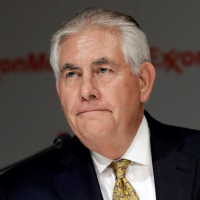CEO Pay System at Top U.S. Energy Firms Rewards Execs for Deepening Climate Crisis
 ExxonMobil CEO Rex Tillerson (photo: LM Otero, AP)
ExxonMobil CEO Rex Tillerson (photo: LM Otero, AP)
One way to help slow climate change might be to stop rewarding executives at oil and coal companies for decisions that are only making the problem worse, according to a new study.
The Institute for Policy Studies (IPS) examined compensation packages at the 30 largest fossil fuel companies and found presidents, CEOs and other top officials have enjoyed good times while their businesses have not. This dynamic has given these leaders no incentive to take new approaches that could help the company and generate less carbon going into the atmosphere, IPS argues.
“One reason why our fossil fuel industries are so stuck and on this destructive path is because of the short-term and perverse executive pay structures,” Sarah Anderson, IPS’s Global Economy Project director and an author of the report (pdf), told ThinkProgress. “All of the incentives are in place for them to think short-term and to stick with business as usual.”
IPS says the stock value of the top 10 U.S. publicly held coal companies fell by 58% between 2010 and 2014. During this period, cash compensation of executives of these companies went up 8%. The biggest winner was ExxonMobil CEO Rex Tillerson, who made $33 million last year, $21.4 million of that from stock-based compensation.
Given this setup, it is no wonder Big Oil and Big Coal don’t want to change their ways. It also helps to explain why none of the 30 companies studied have programs that reward investment in renewable energy sources or other efforts to help stem climate change.
The study said shareholders of ExxonMobil have introduced 62 climate-related resolutions since 1990, but not one has been embraced by management.
-Noel Brinkerhoff
To Learn More:
This Man Made $21 Million Last Year by Ignoring Climate Change (by Samantha Page, ThinkProgress)
Fat Cat Pay at Fossil Fuel Companies Drives Climate Crisis – Report (by Suzanne Goldenberg, The Guardian)
Money to Burn: How CEO Pay is Accelerating Climate Change (by Sarah Anderson, Chuck Collins and Sam Pizzigati, Institute for Policy Studies) (pdf)
7 Companies that Paid their CEOs More Than They Paid in Taxes (by Noel Brinkerhoff, AllGov)
Climate Change Sends Big Agribusiness Companies North to Buy Land to Plant Grain (by Matt Bewig, AllGov)
- Top Stories
- Unusual News
- Where is the Money Going?
- Controversies
- U.S. and the World
- Appointments and Resignations
- Latest News
- Musk and Trump Fire Members of Congress
- Trump Calls for Violent Street Demonstrations Against Himself
- Trump Changes Name of Republican Party
- The 2024 Election By the Numbers
- Bashar al-Assad—The Fall of a Rabid AntiSemite






Comments